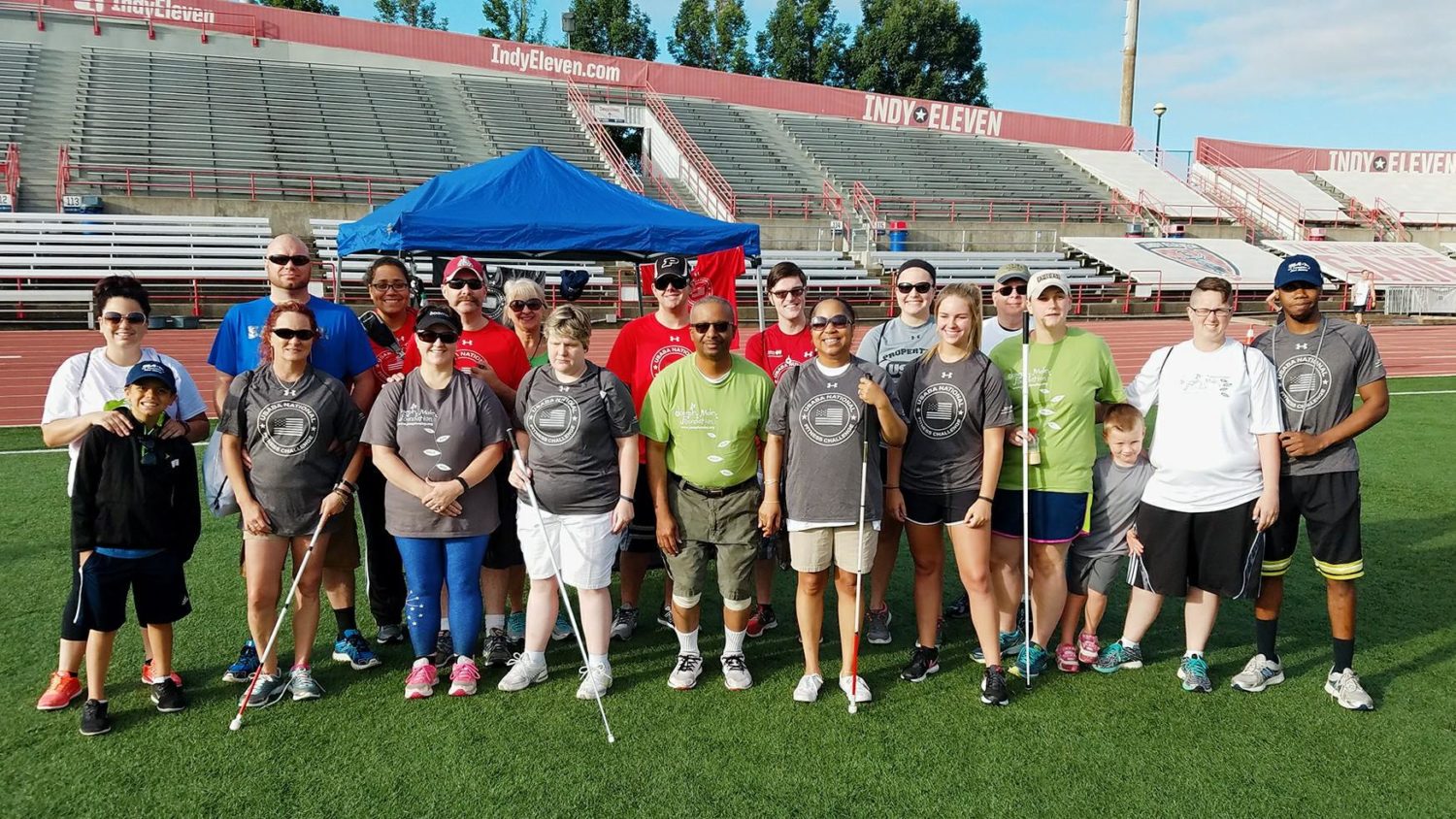Stepping into 2018 with Better Health

More than 340 Americans who are blind and visually impaired took 513 million steps to improve their physical fitness as part of the 2017 USABA-Anthem National Fitness Challenge. Across eight states, participants at 13 partner agencies engaged in sports and fitness programming in their local communities and used Fitbit technology to set goals and track their progress. Their efforts over the nine-month program resulted in weight loss, healthier habits, beating illness and a sense of community.
Established in 2011, the National Fitness Challenge has impacted the lives of more than 3,000 people who are blind and visually impaired across the U.S. The overall goal remains the same each year: to raise the physical activity levels of each participant. The program encourages participants to hit at least 30 minutes of physical activity and 10,000 steps per day.
The thinking behind these goals stems from research consistently showing that individuals who participate in regular physical activity to improve their health have higher energy levels, a lower risk of health-related diseases, improved psychological health, and lower rates of depression and anxiety. Unfortunately, because of the numerous barriers and misconceptions about their abilities, more than half of those who are blind and visually impaired in the United States do not participate in even a limited physical fitness routine, and therefore, aren’t reaping those benefits.
Through grant funding from Anthem Foundation, the United States Association of Blind Athletes (USABA) is working to change that. By partnering with 13 agencies across the country this year, USABA provided resources and opportunities for Fitness Challenge participants to learn about physical fitness, engage in activities in their local community and track their progress.
Beyond the numbers, the program established community both online and in-person. Participants could use the app to see how their step counts were stacking up against fellow participants, send each other challenges and receive “badges” for accomplishing specific goals. Participants were also invited to connect on social media using a Facebook group that was created specifically for this year’s Fitness Challenge participants. Within the group’s newsfeed, participants shared encouraging messages, discussed their progress and posted screenshots of impressive step counts.
At the local level, programming ranged from sport-specific clubs and practices to “try it” events (coined “Paralympic Days”), where participants could meet in person and try different sports or activities adapted for the blind and visually impaired. The National Federation of the Blind Missouri Chapter organized a walking club in which participants met up in different parts of the state to get their step counts together. In Sacramento, Society for the Blind hosted a Paralympic Day in which participants and members of the community could try out golf, judo, goalball, and rowing. Society had 30 attendees ranging in age from 10 to 85! In Colorado, WE Fit Wellness coordinated a four-race running series across the state in which participants trained for the 5k and 10k races to get their steps.
Perhaps the best outcomes of all though were the success stories from participants who experienced a significant impact on their mental and physical health, either through the community the program introduced them to, weight loss or aiding in recovery from a medical issue.
For Illya Popov (Knoxville, Tenn.), who lost the last of his vision last September due to detached retinas, joining the program was the push he needed to lose weight. At 230 lbs. and just a teenager, Popov knew sitting around wasn’t going to help him. He signed up for the challenge with local advocacy and fitness organization for the blind and visually impaired, Club VIBES, and started walking. Since the beginning of the program, Popov has lost 50 pounds and now has a community keeping him motivated to keep going.
Miriam Derai (Cleveland, Ohio) knew little about accessible fitness opportunities available to her. However, after participating in the National Fitness Challenge with Cleveland Sight Center, Derai has discovered a new community of support and ways to exercise in her neighborhood.
At 382 lbs., Jared Jackson (Knoxville, Tenn.) dedicated himself to a structured plan for working out and healthy eating to lose weight. Jackson incorporated his participation in the National Fitness Challenge into his plan and has lost 127 lbs. since February 2015.
In Missouri, Debra Busch (St. Louis) originally joined the challenge to increase her fitness levels and build friendships. Near the end of the Challenge, Busch had done so well increasing her activity levels that her doctor was able to take her off the medication she was taking for Diabetes.
After Avery Neal (Indianapolis, Ind.) sustained a stroke in August 2016, he knew he needed to keep moving as part of his recovery. When the former Marian University sprinter learned about the National Fitness Challenge that following Spring, he signed up and used opportunities provided through the program and the Fitbit to stay active and motivated through his recovery.
The National Fitness Challenge continues to have a positive personal impact on Americans who are blind and visually impaired, thanks to Anthem Foundation. USABA is proud to partner with the Anthem Foundation to further USABA’s mission – to empower Americans who are blind and visually impaired to experience life-changing opportunities in sports, recreation, and physical activity.
Related Posts
National Fitness Challenge Participants Reach Goals Despite Self-IsolationNFC Participants Travel Equivalent of 11 Times Around Earth
2018-2019 Anthem Foundation/USABA National Fitness Challenge Announced
Anthem Foundation and USABA Partner to Inspire Fitness
Accessible Technology Empowers Blind Americans to Get Moving
